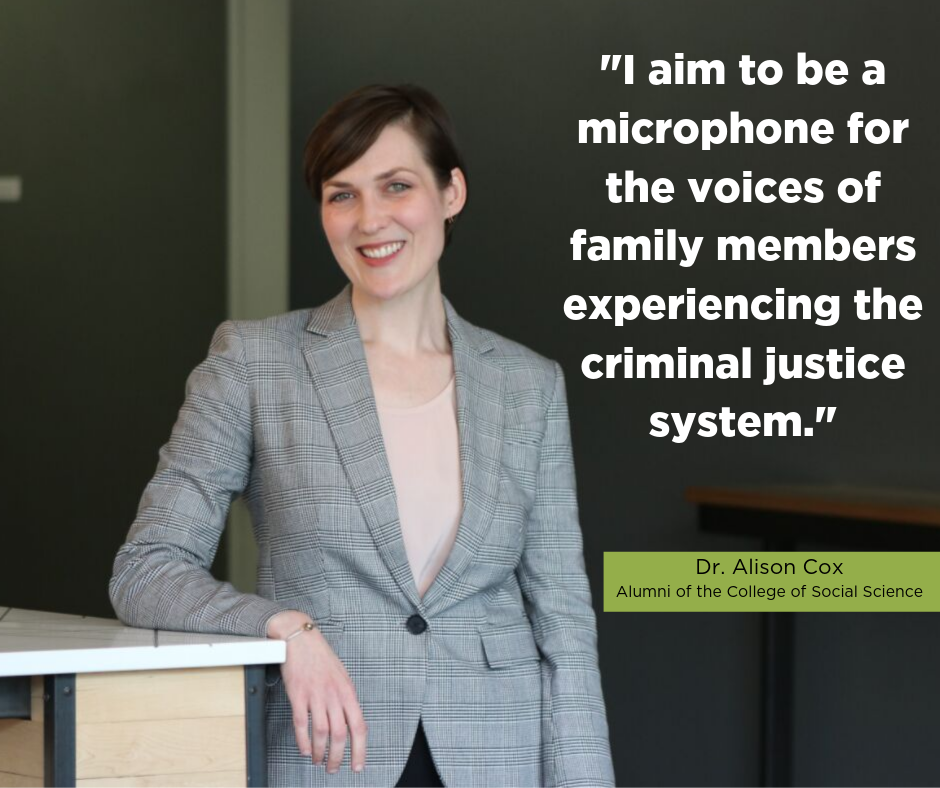
Alison Cox is a recent graduate of the Criminal Justice doctoral program in the College of Social Sciences at MSU. After earning her Bachelor’s Degree at Texas State with dreams of becoming a detective, Alison had two key professional experiences that shaped her path into the one she now walks. First Alison worked for a non-profit women’s center that helped victims of intimate partner violence and sexual assault. She trained advocates for the center and learned of the more empathetic side of criminal justice systems. After this, Alison’s interest in Legal Aid led her to work in family law for a district attorney’s office. This new realm of criminal justice helped Alison see that many people don’t understand the criminal justice system and sometimes their ways of encountering said system wasn’t pleasant. She saw when and how emotions were included in responses and decided that being a lawyer wouldn’t be a good choice for her. Eventually, Alison moved to Michigan to pursue her Master’s and then Ph.D. at MSU.
During her time at MSU, Alison did a lot of things. She was a part-time fitness instructor with Recreational Sports and Fitness Services which helped her keep in shape while connecting with other graduate students. In the moments shared amongst participants in her weight lifting class, Alison felt less alone in her graduate student experiences. She also spent a lot of time in her Lansing neighborhood, even volunteered as a neighborhood center shift leader as a way to make friends, get to know the community, and feed her community-driven sense of purpose. Alison has run a social media Instagram handle @phdbalance because she saw a larger graduate student community there (especially other females in higher education and academia). She shared, “I needed others to relate to the silent suffering in grad experience without good facilitation to talk about it” and found social media as a way to share reflections and get feedback. Additionally, Alison was recognized as the 2019 Student Life Graduate Leadership Award recipient, an honor that she says reminds her of who she was as a graduate student and new academic, and shows up in the work she wants to do - “being a microphone for the voices of family members experiencing the criminal justice system.”
For Alison, the work she completed at MSU and will continue to work on in her new faculty role relates to empathy and emotion in criminal justice. In particular, her dissertation scholarship focused on family members of prisoners who were active in self-created support groups or the people she refers to as the “forgotten victims of the criminal justice system”. She worked closely with the Citizens for Prison Reform, a by family members for family members support group aimed at providing emotional support, advice for navigating the systems and its barriers, as well as advocacy. Alison notes that previous scholarship shows the positive benefits of visitation on incarcerated individuals even after their done serving their sentence, but often policies don’t align to support family visitation. Instead, there are regular barriers that impact the families of incarcerated individuals and they often can’t be as present as they would like for their loved ones. Thinking about the ripple effect that is caused by incarceration- the individuals, families, loved ones who are impacted and often punished by the incarceration as well.
Studies and statistics in criminal justice are often quantitative or numbers-driven, but Alison argues that incarceration is such an individual experience, hearing individual voices to find common ground and make the system better is of vital importance. It is because of this belief that Alison qualifies her early-graduate student time as a member of an interdisciplinary research team as very important to her positionality and work as a scholar. In order to show the empathetic side of criminal justice, Alison found that high-quality qualitative training was necessary, but noticed a lack of available outlets in her college department. As a response, she - along with fellow graduate students interested in qualitative research - created the Feminist Research Methods Graduate Community. While this group is no longer active, current graduate students should reach out to the Center for Gender in Global Context (GenCen) for possible information. Looking into the future, Alison imagines her work as helping the next generation of criminal justice system workers and criminological researchers to have a more empathetic and emotional response to their work.
Originally written and photographed by Makena Neal, 2019


